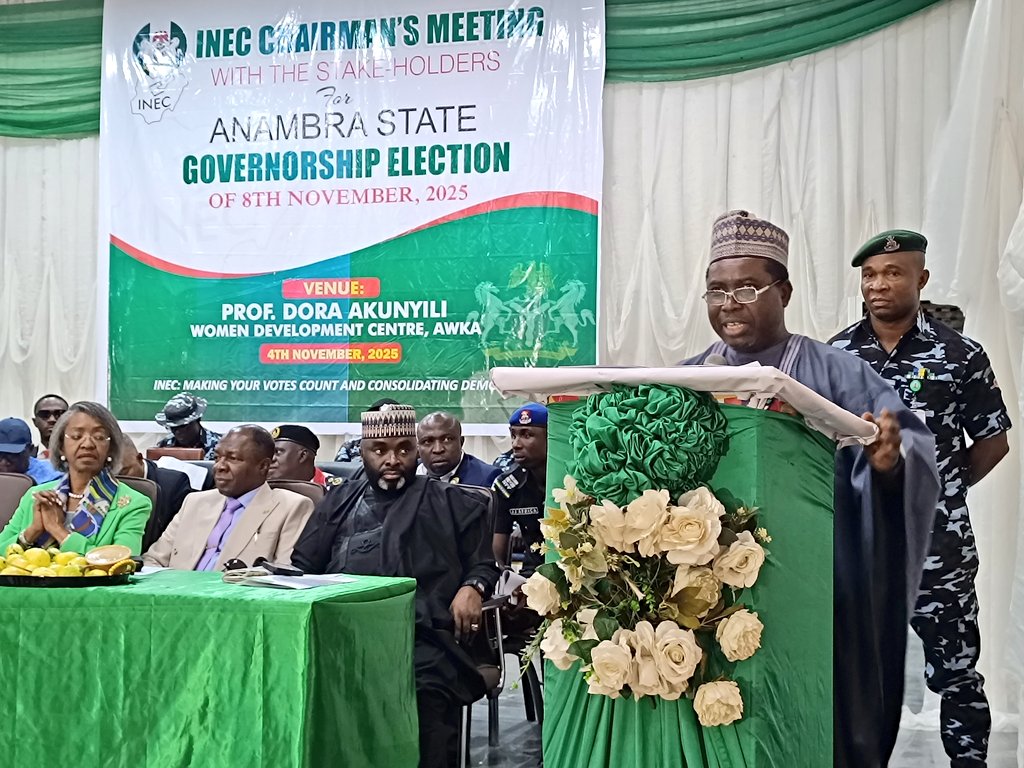Anxiety Peaks as Anambra Prepares for Pivotal Gubernatorial Election Amidst Tight Security

Anambra State is on the verge of electing a new governor, an event marked by palpable tension and uncertainty. Concerns regarding a robust security presence, widespread reports of vote buying, and a general climate of insecurity threaten to overshadow the integrity of the electoral exercise. A significant source of apprehension stems from growing public skepticism about the capacity of the Independent National Electoral Commission (INEC), particularly under its new Chairman, Prof Joash Amupitan, to conduct an election that is genuinely free, fair, and credible.
This election marks a crucial debut for Prof. Joash Amupitan, who faces the challenge of distinguishing himself from his predecessor, Prof Mahmood Yakubu, whose tenure was plagued by logistical issues, late material delivery, Bimodal Voter Accreditation System (BVAS) glitches, and delayed result uploads during the 2023 general elections. Amupitan has pledged to restore public trust through innovation, transparency, and discipline. As part of its extensive preparations, INEC reported an impressive 98.8% Permanent Voter Card (PVC) collection rate, a figure deemed one of the highest in recent Nigerian electoral history. This surge followed an extension of the collection period across 326 registration areas, catering to 2,802,790 eligible voters. The Commission has deployed 6,879 BVAS devices, along with reserve units, and prepared over 24,000 ad hoc personnel, 3,000 vehicles, and 83 boats to ensure the simultaneous opening of all 5,718 polling units. The distribution of sensitive materials, including BVAS and forms EC8A/EC8B, was supervised by the Resident Electoral Commissioner (REC), Dr Queen Elizabeth Agwu, alongside party agents and security operatives, ensuring transparency. Four National Commissioners and ten Resident Electoral Commissioners have been deployed to supervise the election directly, with special security arrangements for six registration areas in Ihiala Local Council.
A substantial security contingent of no fewer than 60,000 personnel, comprising officers from the Police, Civil Defence, Army, Navy, and Air Force, has been deployed across the state's 5,720 polling units. The Commissioner of Police, Abayomi Shogunle, confirmed that the police alone contributed approximately 45,000 officers, supported by tactical units, helicopters, and drones for aerial surveillance to complement ground patrols. While authorities insist this deployment aims to ensure safety and voter confidence, the decision to bar the state-owned security outfit, Agunechemba, has drawn criticism. The International Society for Civil Liberties and Rule of Law (Intersociety) raised concerns about the growing militarisation of the electoral process, cautioning that a "war-like atmosphere" created by heavy security equipment and personnel often intimidates vulnerable voters and discourages participation. Intersociety urged security agencies to adopt intelligence-driven, tactically discreet, and non-intimidating approaches to foster a higher voter turnout.
Despite INEC’s assurances, significant doubts persist among political actors and civil society groups regarding the election's credibility. Sceptics, including Wale Okunniyi of the National Consultative Front (NCFront) and retired military officer Captain Mbamara, argue that the absence of substantial electoral law reform means little will change, limiting the new Chairman's capacity for innovation. Concerns are also high over vote buying and the declining rate of voter participation, a trend noted by both INEC and Intersociety. Voter turnout in Anambra governorship elections has steadily decreased from 46% in 1999 to 10.5% in 2021. The CLEEN Foundation identified five local councils—Ayamelum, Awka South, Onitsha North, Orumba South, and Ekwusigo—as high-risk zones due to past violence and non-state armed groups. The Civil Liberties Organisation (CLO) lamented poor voter education, particularly in rural areas, attributing widespread apathy to a lack of confidence in the electoral process stemming from past experiences.
Sixteen candidates from various political parties will vie for the governorship seat, with approximately 2.8 million registered voters expected to cast their ballots. Among the twenty political parties contesting, the incumbent Governor Prof. Chukwuma Soludo of the All Progressives Grand Alliance (APGA) and Nicholas Ukachukwu of the All Progressives Congress (APC) are considered frontrunners. The election serves as a critical test of strength for APGA, which faces challenges from the Labour Party (LP) and the Peoples Democratic Party (PDP).
The international community, notably the European Union (EU), is closely monitoring the election, having deployed 687 election observers through its EU Support to Democratic Governance in Nigeria (EU-SDGN) programme. Seven implementing partners, including The Kukah Centre, Yiaga Africa, International Press Centre (IPC), Centre for Media and Society (CEMESO), Nigeria Women Trust Fund (NWTF), ElectHER, and TAF Africa, are on the ground, operating from a Unified Election Observation Hub to ensure comprehensive oversight. Yiaga Africa has specifically urged INEC to enhance its oversight of election logistics and deployment, emphasizing strict supervision of transport companies handling materials and personnel.
The outcome of the Anambra election extends beyond the immediate contest, carrying far-reaching implications for the 2027 general elections. Analysts suggest that a credible and peaceful poll could significantly bolster public confidence in INEC and Nigeria's democratic institutions. Conversely, any significant setback or failure in delivering a transparent and fair process could deepen scepticism about the nation's electoral integrity. As major candidates intensify last-minute campaigns, Anambra State stands poised for a crucial examination of its democratic maturity and commitment to strengthening its electoral framework.
You may also like...
Ndidi's Besiktas Revelation: Why He Chose Turkey Over Man Utd Dreams

Super Eagles midfielder Wilfred Ndidi explained his decision to join Besiktas, citing the club's appealing project, stro...
Tom Hardy Returns! Venom Roars Back to the Big Screen in New Movie!

Two years after its last cinematic outing, Venom is set to return in an animated feature film from Sony Pictures Animati...
Marvel Shakes Up Spider-Verse with Nicolas Cage's Groundbreaking New Series!

Nicolas Cage is set to star as Ben Reilly in the upcoming live-action 'Spider-Noir' series on Prime Video, moving beyond...
Bad Bunny's 'DtMF' Dominates Hot 100 with Chart-Topping Power!

A recent 'Ask Billboard' mailbag delves into Hot 100 chart specifics, featuring Bad Bunny's "DtMF" and Ella Langley's "C...
Shakira Stuns Mexico City with Massive Free Concert Announcement!

Shakira is set to conclude her historic Mexican tour trek with a free concert at Mexico City's iconic Zócalo on March 1,...
Glen Powell Reveals His Unexpected Favorite Christopher Nolan Film

A24's dark comedy "How to Make a Killing" is hitting theaters, starring Glen Powell, Topher Grace, and Jessica Henwick. ...
Wizkid & Pharrell Set New Male Style Standard in Leather and Satin Showdown

Wizkid and Pharrell Williams have sparked widespread speculation with a new, cryptic Instagram post. While the possibili...
Victor Osimhen Unveils 'A Prayer From the Gutter', Inspiring Millions with His Journey

Nigerian football star Victor Osimhen shares his deeply personal journey from the poverty-stricken Olusosun landfill in ...




